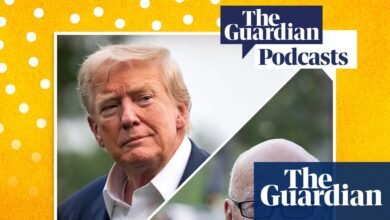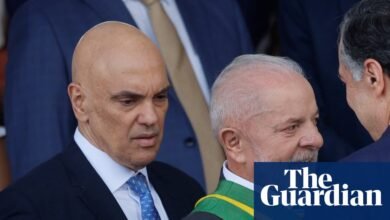Qatar defends offer of plane gift to Trump as ‘a normal thing between allies’ – US politics live | US news
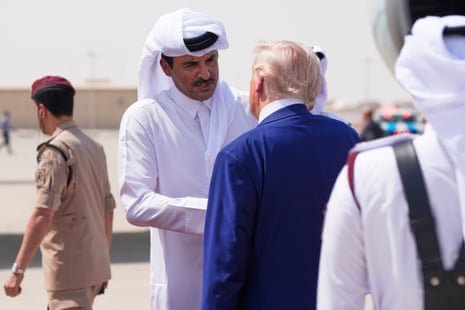
Qatar says plane offer for Trump is ‘a normal thing between allies’
Qatar’s offer to give Donald Trump a $400m Boeing 747 airplane is a “normal thing that happens between allies,” prime minister Sheikh Mohammed bin Abdulrahman Al Thani has said at an economic forum held in Doha.
Al Thani dismissed concerns about Qatar trying to buy influence with its key ally, after the Senate Democratic leader Chuck Schumer introduced a bill on Monday that would prevent any foreign aircraft operating as Air Force One amid ethical and security concerns.
“I hope that the United States looks to Qatar as a reliable partner in diplomacy that is not trying to buy influence,” Al Thani said.
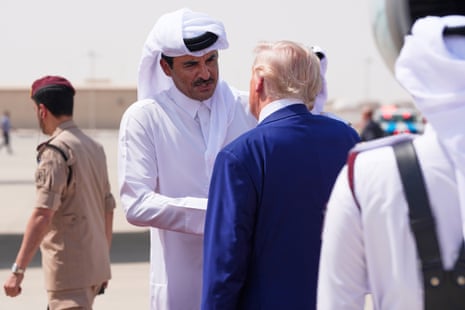
Trump has shrugged off worries, saying it would be “stupid” to turn down the generous offer. He said the Boeing 747-8 would eventually be donated to his presidential library – a repository housing research materials from his administration, and that he had no plans to use it for personal reasons after leaving office.
White House press secretary Karoline Leavitt said on Monday that the aircraft “will be accepted according to all legal and ethical obligations.”
“Retrofitting the Qatari plane would cost billions and could never even truly eliminate all catastrophic risks,” Schumer said on X.
The bill would prevent the US from spending taxpayer dollars to retrofit a foreign-owned plane for presidential use.
“There’s absolutely no amount of modifications that can guarantee it will be secure,” Schumer added.
In other developments:
-
Vladimir Putin and Donald Trump have held a rare phone call, which the US leader described as “excellent”, but the Kremlin refused to agree to a ceasefire in the war with Ukraine, despite pressure from Washington and European allies.
-
Donald Trump lashed out at celebrities who endorsed Kamala Harris in late night and early morning screeds on Monday, saying he would investigate them to see if they were paid for the endorsements – repeating a common refrain on the right about the star-studded list of Harris supporters.
-
At least 50 Venezuelan men sent by the Trump administration to a prison in El Salvador had entered the US legally, according to a review by the Cato Institute. Published by the libertarian thinktank on Monday, the report analyzed the available immigration data for only a portion of the men who were deported to El Salvador’s notorious Terrorism Confinement Center (Cecot), and focuses on the cases where records could be found.
-
Donald Trump’s administration can end legal protections that have shielded about 350,000 Venezuelans from potential deportation, the supreme court ruled on Monday. America’s highest court granted a request by Kristi Noem, the homeland security secretary, to revoke temporary protected status (TPS) for the Venezuelans while an appeal proceeds in a lower court.
-
US representative LaMonica McIver, a Democrat, was charged with assaulting federal agents after a clash outside an immigration detention center in New Jersey, the state’s federal prosecutor announced on Monday.
-
The former FBI director James Comey has brushed off criticism about a photo of seashells he posted on social media, saying it is “crazy” to think the messaged was intended as a threat against Donald Trump. “I posted it on my Instagram account and thought nothing more of it, until I heard … that people were saying it was some sort of a call for assassination, which is crazy,” Comey said in interview on MSNBC.
-
The Columbia University student Mohsen Mahdawi, who was released only weeks ago from federal detention, has crossed the graduation stage to cheers from his fellow graduates. The Palestinian activist was arrested by immigration authorities in Colchester, Vermont, while attending a naturalization interview.
-
Donald Trump has signed into law the Take It Down Act, a measure that imposes penalties for online sexual exploitation that Melania Trump helped usher through Congress.
Key events
Robert F Kennedy Jr calls WHO ‘moribund’ and urges other countries to quit
US health and human services secretary Robert F Kennedy Jr dismissed the World Health Organization as bloated and “moribund” in a video shown to global health officials meeting earlier today for the body’s annual assembly in Geneva.
The United States, the UN agency’s top donor, announced it would withdraw from the WHO on the first day of Donald Trump’s presidency, leaving the organisation with a massive budget shortfall that it is seeking to address through reforms at this week’s assembly.
In a video recorded on Fox News and then streamed to the assembly RFK Jr said:
I urge the world’s health ministers and the WHO to take our withdrawal from the organisation as a wake-up call. We’ve already been in contact with like-minded countries and we encourage others to consider joining us.
His speech did not prompt any immediate response from the assembly. Diplomats and ministers mostly watched the address in silence.
Trump has accused the WHO of mishandling Covid and of being too close to China – allegations it denies.
Kennedy is an environmental lawyer who has long sown doubts about the safety and efficacy of vaccines that have helped curb disease and prevented millions of deaths for decades, and clashed with US lawmakers last week in a hearing disrupted by protesters.
In his comments to the WHO, Kennedy called it “mired in bureaucratic bloat, entrenched paradigms, conflicts of interest and international power politics”.
We don’t have to suffer the limits of a moribund WHO – let’s create new institutions or revisit existing institutions that are lean, efficient, transparent and accountable.
Kennedy’s comments were broadcast hours after WHO member states adopted an agreement to better prepare for future pandemics.
Kennedy said the accord would “lock in all the dysfunctions of the WHO pandemic response”.
At least 50 migrants sent to El Salvador prison entered US legally, report finds
Coral Murphy Marcos
At least 50 Venezuelan men sent by the Trump administration to a prison in El Salvador had entered the United States legally, according to a review by the Cato Institute.
The report, published by the libertarian thinktank on Monday, analyzed the available immigration data for only a portion of the men who were deported to El Salvador’s notorious Terrorism Confinement Center (Cecot), and focuses on the cases where records could be found.
“The government calls them all ‘illegal aliens.’ But of the 90 cases where the method of crossing is known, 50 men report that they came legally to the United States, with advanced US government permission, at an official border crossing point,” Cato said in its report.
This number aligns with broader trends among Venezuelan migrants, many of whom entered the country either as refugees or through a Biden-era parole program that granted two-year work permits to those with US-based sponsors.
“The proportion isn’t what matters the most: the astounding absolute numbers are,” reads the report. “Dozens of legal immigrants were stripped of their status and imprisoned in El Salvador.”
Cato’s analysis goes against the Trump administration’s justification for sending the men to El Salvador, saying that only undocumented people were deported.
Social security cuts incite fears of payment disruptions
Michael Sainato
Retiree and disability beneficiaries are worried about delays in payments, processing and services amid cuts being made to the US’s social security system under the Trump administration.
Angel Morgan, a 44-year-old disability benefits recipient in Nashville, Tennessee, said she felt like she was “running in circles” navigating long lines at her local social security office and difficulties in trying to make an appointment online to talk about her benefits and how to participate in the Ticket to Work program, which provides career development services for disability beneficiaries.
“I struggle with social settings and these things just make it worse. Trump doesn’t care about the struggles we go through and won’t quit until we are all bankrupt and either dead or wanting to die,” said Morgan.
An average of nearly 69 million Americans will receive social security benefits a month in 2025, most of them older people or those with disabilities.
The agency has been a significant target of the so-called “department of government efficiency” (Doge) and its former leader Elon Musk, who has called social security “the biggest Ponzi scheme of all time”.
Attacks on social security are not new – Republicans have long pushed to privatize social security and raise the retirement age to 69 years old – but the latest salvoes are having a profound impact on the agency and those who rely upon it.
Richard Luscombe
These are challenging days for Florida governor Ron DeSantis, the man who would have been king. Barely two and a half years since his landslide re-election and anointment as “DeFuture” of the Republican party in a fawning New York Post cover, he stands isolated from the national political stage, feuding with his once blindingly loyal Florida legislature, and limping towards the finish line of his second term with an uncertain pathway beyond.
It has been, in the view of many analysts, a fall of stunning velocity and magnitude. And while few are willing to completely rule out a comeback for a 46-year-old politician who was the darling of the Republican hard right until he dared to challenge Donald Trump for his party’s 2024 presidential nomination, it is also clear that everything has changed.
“He’s completely crashed to the ground at this point and is certainly being treated like a more standard, average governor now,” said Aubrey Jewett, professor of political science at the University of Central Florida.
Jewett added:
He’s lost the ability to push things through. He’s lost that luster he had that at one time seemed like he could do no wrong in Republican conservative circles. He’s definitely come back down to earth and some of it is his own doing because if you govern with an autocratic style, that doesn’t usually make you a lot of allies.
DeSantis’s once vise-like grip on Florida’s lawmakers has weakened, replaced by open dissent, bitter hostility and a hurling of slurs over a number of issues as the two Republican dominated legislative chambers try to reverse six years of passivity and reestablish themselves as a co-equal branch of government.
DeSantis, in the words of Republican House speaker Daniel Perez, has begun to tell “lies and stories that never happened”, and has become increasingly prone to “temper tantrums”.
Two Democrats on the US Federal Trade Commission (FTC) who were fired by President Donald Trump in March will urge a federal judge in Washington to declare the move illegal on Tuesday, in the latest showdown over the limits of presidential power.
Alvaro Bedoya and Rebecca Kelly Slaughter seek an order declaring their terminations unlawful and allowing them to resume their work at the agency, which enforces consumer protection and antitrust law, reports Reuters.
The case is one of several testing a 90-year-old supreme court precedent that shields independent agencies from direct White House control. A ruling overturning it could reverberate far and wide, shaking the independence of agencies that regulate road safety, stock markets, telecommunications and monetary policy.
Bedoya and Slaughter say their terminations on 18 March openly defied a law allowing the president to fire FTC commissioners only for good cause, such as neglecting their duties.
The supreme court upheld that law in the 1935 case Humphrey’s Executor v. US, after the last time a US president attempted to fire an FTC commissioner over a policy disagreement.
Congress has the power to create agencies that serve legislative or judicial functions, and allowing the president to control those agencies violates the separation of powers, the supreme court ruled.
The Trump administration has argued Humphrey’s Executor does not apply to the current FTC, which gained the authority to sue in federal court to block mergers and seek financial penalties after the case was decided, reports Reuters.
As it now exists, the FTC should be considered part of the executive branch controlled by the president, not Congress, the administration has said.
Multiple courts have considered that argument and rejected it, saying the supreme court settled the matter, Slaughter and Bedoya said.
The FTC, now led by three Republicans, is structured so that no more than three of its five commissioners come from the same party.
The case is playing out at the same time as similar challenges by members of the Merit Systems Protection Board (MSPPB) and National Labor Relations Board (NLRB) who were fired by Trump.
The supreme court could rule at anytime on whether the Trump administration must reinstate the MSPB and NLRB members, while this case is being reviewed.
South African government to offer Elon Musk a business deal – report
South Africa’s government plans to offer a workaround of local Black ownership laws for Elon Musk’s Starlink internet service to operate in the country, Bloomberg News reported on Tuesday, citing three people familiar with the discussions.
The offer will come at a last-minute meeting planned for Tuesday night between Musk or his representatives and a delegation of South African officials traveling with president Cyril Ramaphosa, the report added, according to Reuters.
Musk objects to a law requiring that investors in the telecoms sector provide 30% of the equity in the South African part of the enterprise to Black-owned businesses.

Callum Jones
JP Morgan’s chief executive, Jamie Dimon, warned on Monday that investors were being too complacent as markets shook off news that the US has lost its last triple-A credit rating amid fresh concern over the federal government’s burgeoning debt pile.
Credit rating agency Moody’s dealt a blow to Washington on Friday when it stripped the US of its top-notch rating, downgrading the world’s largest economy by one notch to AA1 and become becoming the last of the big three agencies to drop its triple-A rating for the US.
The announcement unnerved markets on Monday morning, but stock markets had recovered by the end of the day.
Speaking at JP Morgan’s annual investor day meeting in New York, Dimon warned against complacency. “We have huge deficits; we have what I consider almost complacent central banks. You all think they can manage all this. I don’t think [they can],” he said.
Dimon said he saw an “extraordinary amount of complacency” and added that he believes the possibility of stagflation – a recession with rising prices – was far higher than investors believe.
Moody’s downgrade came as Donald Trump struggles to push his “big, beautiful” tax and spending bill through Congress, Moody’s said it expected the US budget deficit to keep rising.
“Successive US administrations and Congress have failed to agree on measures to reverse the trend of large annual fiscal deficits and growing interest costs,” Moody’s said, announcing its downgrade. “We do not believe that material multi-year reductions in mandatory spending and deficits will result from current fiscal proposals under consideration.”
Trump on Capitol Hill to meet Republicans amid effort to pass sweeping tax bill
President Donald Trump is expected to head to Capitol Hill on Tuesday to meet congressional Republicans as they aim to reach agreement on a sweeping tax-cut bill, with their narrow majority divided over the scope of spending cuts, reports Reuters.
Hardline Republicans in the US House of Representatives on Friday briefly blocked the advance of the bill – which nonpartisan analysts say could add $3tn to $5tn to the federal government’s $36.2tn debt – but relented on Sunday.
The bill would extend the 2017 tax cuts that were Trump’s signature first-term legislative achievement, and also add tax breaks on income from tips and overtime pay that were part of his populist push on the campaign trail.
According to Reuters, he is expected to try to unify the divided 220-213 House majority, including hardliners eager for deep spending cuts, moderates worried about protecting Medicaid and Republican lawmakers from coastal states eager to protect their constituents’ ability to deduct state and local taxes.
Republicans are looking to parliamentary maneuvres to bypass the objections of Democrats, who say the bill disproportionately benefits the wealthy and will take a deep bite out of social programs.
“I think he’ll urge people to get together and I think it’ll be an upbeat speech … I’m glad he’s coming,” said hardline Republican Representative Ralph Norman of South Carolina, one of the handful who voted against the bill on Friday.
House speaker Mike Johnson aims to pass the measure by Thursday, before the Memorial Day holiday weekend, setting the stage for the Senate to take it up next month.
“I’m very optimistic we will find the right equilibrium point to get this bill delivered,” Johnson told reporters on Monday, even as he acknowledged that some thorny issues were unresolved.
Hanging over Republicans is a move by credit-ratings firm Moody’s, which last week stripped the US federal government of its top-tier credit rating. It cited multiple administrations and Congress failing to address the nation’s growing debt. The Republican-controlled Congress so far has not rejected any of Trump’s legislative requests.
If the House passes the bill, the Senate will have to labor to pass a partisan bill that could differ significantly from the House’s.
“It’s not going to happen overnight. But it should happen in a timely way,” Senate majority leader John Thune of South Dakota told reporters on Monday, according to Reuters.
Republicans control the Senate by a 53-47 margin and at least one conservative, Senator Josh Hawley of Missouri, has already stated reservations with the House’s Medicaid provisions.
The Kennedy Center announced its lineup on Monday, which includes performances of “Chicago,” “Moulin Rouge” and “Back to the Future: The Musical.” The offerings for kids includes a theatrical version of the cartoon hit “Bluey”, reports the Associated Press (AP).
The center previously abandoned a week’s worth of July events celebrating LGBTQ+ rights as part of this summer’s World Pride festival in Washington.
The White House has further moved to cancel millions in previously awarded federal humanities grants to arts and culture groups. And Donald Trump’s budget framework has proposed eliminating the National Endowment for the Arts and the National Endowment for the Humanities altogether.
According to the AP, Trump told the Kennedy Center dinner that congressional Republicans have pushed for more than $250m for repairs and maintenance at the Kennedy Center, and said that, over the past decade, “tremendous amounts of money” was spent there. “I don’t know where they spent it,” he said. “They certainly didn’t spend it on wallpaper, carpet or painting.”
Richard Grenell, a Trump envoy for special missions who is interim head of the Kennedy Center, said a previous budget included “$26m in phantom revenue.” He suggested the behavior could be a criminal matter for prosecutors and that attorney general Pam Bondi, in addition to being on the center’s board, heard the details at a meeting earlier on Monday.
“She heard the details, and this is unacceptable,” Grenell said.
Trump said the center would raise funds but added of the building’s state that it’s “falling apart”. He said previous “programming was out of control with rampant political propaganda” and featured “some very inappropriate shows” including a “Marxist anti-police performance” and “Lesbian-only Shakespeare”.
“Who thinks of these ideas, really?” Trump cried, drawing loud laughs from those present, reports the AP.
President Donald Trump hosted the Kennedy Center’s leadership at the White House on Monday night, reinforcing how much attention he is devoting to remaking a premier cultural center as part of a larger effort to overhaul the social and ideological dynamics of the national arts scene.
According to the Associated Press (AP), the meeting of the center’s board in the state dining room followed Trump firing its previous members and announcing in February that he would serve as the board’s chair. The new board, which unanimously approved Trump as its chair, is stocked with loyalists.
They include White House chief of staff Susie Wiles; attorney general Pam Bondi; Usha Vance, the wife of vice-president JD Vance; and Lee Greenwood, whose song “God Bless the USA,” plays at Trump rallies as well as many official events, including during his trip to the Middle East last week. Trump called it a “hot board.”
“We’re gonna turn it around,” Trump told dinner attendees of the center. He said of running the board, “When I said, ‘I’ll do this,’ I hadn’t been there” and joked, “That’s the last time I’ll take a job without looking at it”.
Trump has called the center’s past programming “woke” and “terrible,” while more broadly seeking to slash federal funding for the arts – complaining that too much programming promotes leftist ideology and political correctness. In his view, molding the Kennedy Center to his own liking can go a long way toward creating a new arts and social culture nationwide, reports the AP.
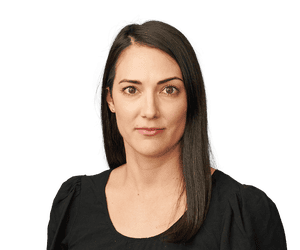
Lauren Gambino
US representative LaMonica McIver, a Democrat, was charged with assaulting federal agents after a clash outside an immigration detention center in New Jersey, the state’s federal prosecutor announced on Monday.
Alina Habba, interim US attorney, said in a post on social media that McIver was facing charges “for assaulting, impeding and interfering with law enforcement” when she visited the detention center along with two other Democratic members of the New Jersey congressional delegation on 9 May.
“No one is above the law – politicians or otherwise,” Habba said in a statement. “It is the job of this office to uphold justice impartially, regardless of who you are. Now we will let the justice system work.”
McIver on Monday accused federal law enforcement of escalating the situation, saying that it was the Immigration and Customs Enforcement (Ice) agents who “created an unnecessary and unsafe confrontation”.
“The charges against me are purely political – they mischaracterise and distort my actions, and are meant to criminalise and deter legislative oversight,” she said.
At the same time, Habba announced her office was dismissing a misdemeanor trespassing charge against Ras Baraka, the Democratic mayor of Newark, whose arrest instigated the clash with federal agents.
Demand Justice launches ad campaign to highlight Trump’s attacks on the rule of law

Sam Levine
The left-learning advocacy group Demand Justice plans to undetake a six-figure advertising effort as part of a new campaign to highlight Donald Trump’s continued attacks on the rule of law.
The adverting campaign, which will include online and print ads in national publications is part of a multi-pronged effort called “Justice Under Siege” will include polling, research, and educational initiatives focused on how the Trump administration is attacking the rule of law, a fundamental pillar of American society
“Since his inauguration, President Trump has repeatedly defied lawful court orders on issues ranging from illegally firing thousands of public servants to deporting lawful US residents without due process,” Maggie Jo Buchanan, the group’s executive director, said in a statement.
We’ll systematically document and expose this pattern of attacks on the rule of law, which is made even more alarming by congressional Republicans who aren’t just letting Trump get away with it, but actively participating through threats to defund courts, legislative stunts to take away the ability of the judiciary to check Trump’s overreach, and baseless impeachment efforts against judges whose rulings they disagree with.
The group has previously targeted major law firms who capitulated to Trump with posters around Washington DC near the offices of the firms in the US capitol.
Since taking office in January, Trump’s attacks on the rule of law have been brazen and unrelenting.
He has openly defied court orders halting deportations, called for a federal judge who ruled against him to be impeached, issued executive orders punishing law firms connected to political rivals, and used the power of his office to revoke the security clearance and investigate officials who spoke out against him.
There have also been an alarming rise in threats and harassment against federal judges in recent months as the president has escalated his attacks.
There has been little pushback from Republicans to Trump’s actions. Chief Justice John Roberts spoke out in defense of judges in March, saying:
For more than two centuries, it has been established that impeachment is not an appropriate response to disagreement concerning a judicial decision. The normal appellate process exists for that purpose.
Judge Ketanji Brown Jackson, the newest member of the court and one of its liberal members, said this monththat the attacks on judges “are not random. They seem designed to intimidate those of us who serve in this critical capacity.”
Qatar says plane offer for Trump is ‘a normal thing between allies’
Qatar’s offer to give Donald Trump a $400m Boeing 747 airplane is a “normal thing that happens between allies,” prime minister Sheikh Mohammed bin Abdulrahman Al Thani has said at an economic forum held in Doha.
Al Thani dismissed concerns about Qatar trying to buy influence with its key ally, after the Senate Democratic leader Chuck Schumer introduced a bill on Monday that would prevent any foreign aircraft operating as Air Force One amid ethical and security concerns.
“I hope that the United States looks to Qatar as a reliable partner in diplomacy that is not trying to buy influence,” Al Thani said.
Trump has shrugged off worries, saying it would be “stupid” to turn down the generous offer. He said the Boeing 747-8 would eventually be donated to his presidential library – a repository housing research materials from his administration, and that he had no plans to use it for personal reasons after leaving office.
White House press secretary Karoline Leavitt said on Monday that the aircraft “will be accepted according to all legal and ethical obligations.”
“Retrofitting the Qatari plane would cost billions and could never even truly eliminate all catastrophic risks,” Schumer said on X.
The bill would prevent the US from spending taxpayer dollars to retrofit a foreign-owned plane for presidential use.
“There’s absolutely no amount of modifications that can guarantee it will be secure,” Schumer added.
In other developments:
-
Vladimir Putin and Donald Trump have held a rare phone call, which the US leader described as “excellent”, but the Kremlin refused to agree to a ceasefire in the war with Ukraine, despite pressure from Washington and European allies.
-
Donald Trump lashed out at celebrities who endorsed Kamala Harris in late night and early morning screeds on Monday, saying he would investigate them to see if they were paid for the endorsements – repeating a common refrain on the right about the star-studded list of Harris supporters.
-
At least 50 Venezuelan men sent by the Trump administration to a prison in El Salvador had entered the US legally, according to a review by the Cato Institute. Published by the libertarian thinktank on Monday, the report analyzed the available immigration data for only a portion of the men who were deported to El Salvador’s notorious Terrorism Confinement Center (Cecot), and focuses on the cases where records could be found.
-
Donald Trump’s administration can end legal protections that have shielded about 350,000 Venezuelans from potential deportation, the supreme court ruled on Monday. America’s highest court granted a request by Kristi Noem, the homeland security secretary, to revoke temporary protected status (TPS) for the Venezuelans while an appeal proceeds in a lower court.
-
US representative LaMonica McIver, a Democrat, was charged with assaulting federal agents after a clash outside an immigration detention center in New Jersey, the state’s federal prosecutor announced on Monday.
-
The former FBI director James Comey has brushed off criticism about a photo of seashells he posted on social media, saying it is “crazy” to think the messaged was intended as a threat against Donald Trump. “I posted it on my Instagram account and thought nothing more of it, until I heard … that people were saying it was some sort of a call for assassination, which is crazy,” Comey said in interview on MSNBC.
-
The Columbia University student Mohsen Mahdawi, who was released only weeks ago from federal detention, has crossed the graduation stage to cheers from his fellow graduates. The Palestinian activist was arrested by immigration authorities in Colchester, Vermont, while attending a naturalization interview.
-
Donald Trump has signed into law the Take It Down Act, a measure that imposes penalties for online sexual exploitation that Melania Trump helped usher through Congress.

